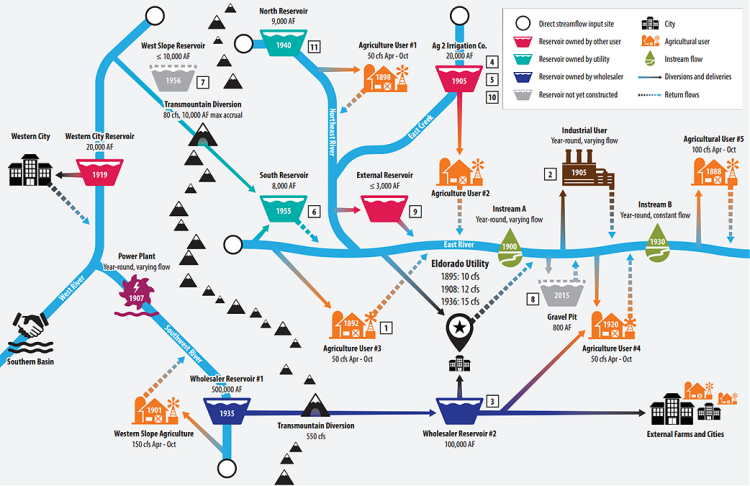Producing Regionally Relevant Multiobjective Tradeoffs to Engage Colorado Water Managers
Funding Agencies

- National Oceanographic and Atmospheric Administration (NOAA) through their Sectoral Applications Research Program (SARP)
- CU CEAE and CADSWES
Research Team
- Rebecca Smith, PhD project
- Joseph Kasprzyk, Lisa Dilling, Leon Basdekas and Larna Kaatz, principal investigators
- Patrick Lynn and David Neumann, CADSWES
Disseminating results from water resources systems analysis research can be challenging when there are political or regulatory barriers associated with real-world models or when a research model does not incorporate management context to which practitioners can relate. As part of a larger transdisciplinary study, we developed a broadly applicable case study in collaboration with our partners at six diverse water utilities on the Front Range of Colorado, USA. Our model, the “Eldorado Utility Planning Model,” incorporates realistic water management decisions and objectives and achieves a pragmatic balance between system complexity and simplicity.
Using the sophisticated modeling platform RiverWare, we modeled a spatially distributed regional network, in which, under varying climate scenarios, the Eldorado Utility can meet growing demand from its variety of sources and by interacting with other users in the network. In accordance with complicated Front Range water laws, ownership, priority of use, and restricted uses of water are tracked through RiverWare’s accounting functionality. To achieve good system performance, Eldorado can make decisions such as expand/build a reservoir, purchase rights from one or more actors, and enact conservation.
The Eldorado Utility Planning Model is being used to aid researchers in developing multiobjective evolutionary algorithm (MOEA)-based optimization for similar multireservoir systems in Colorado and the Western U.S. Within the optimization, system performance is quantified by five objectives:
- Minimizing time in restrictions
- New storage capacity
- Newly developed supply
- Uncaptured water
- Maximizing year-end storage
Our results demonstrate critical tradeoffs between the objectives and show how these tradeoffs are affected by several realistic climate change scenarios. These results were used in an interactive workshop that helped demonstrate the application of MOEA-based optimization for water management in the Western U.S.
Smith, Rebecca M. (2017), “Co-production with Water Managers to Evaluate Multiobjective Evolutionary Algorithm (MOEA)-assisted Optimization for Long Term Water Utility Planning and Shape Future Research Agendas,” Civil, Environmental and Architectural Engineering PhD thesis, University of Colorado, Boulder, Colorado.

